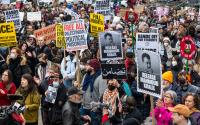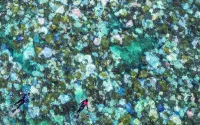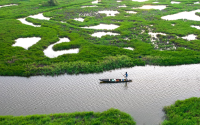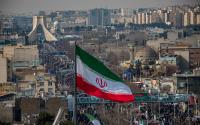Leo Hickman, Esther Addley and Laura BartonWednesday March 20, 2002The GuardianMichael GoveEvery day since tragedy struck, evil has found its apologists in our midst, drawn overwhelmingly from the ranks of the old left and published overwhelmingly in the new Guardian ... The radical left may have learnt from consumer culture the importance of subtle packaging, but underneath the New Bond Street suit, the old left heartbeat quickens at the same prejudices. The radical left retains an antipathy to our common western values which still finds its expression in anti-Americanism, anti-Zionism and the romanticism of revolutionary violence. The Times, September 15 2001 People's attitudes have changed because the war on terror hasn't gone quite according to anyone's script. The critics on the left and the right exaggerated the difficulties that would be faced by the coalition, and so the collapse of the Taliban surprised many people. There was a period after that when some supporters of the war began to think that this was all a breeze, and that the west could fix all the world's problems in its spare time. At present we're going through a critical period, when expectations are having to be recalibrated, after a period when people thought it was beginning to look too easy. We are absolutely right to deploy the troops, and Blair and Hoon are absolutely right to defend them. It's the case that, on both the right and the left, there's a significant isolationist, anti-American strand which is unhappy with the government's conduct over the war on terror. But the first thing I say to critics of the war is: what's your alternative? I was critical, initially, of the Kosovan campaign, but in the end one had to conclude that the alternatives to intervention were elusive. The public mood is volatile at present, and there's a great degree of isolationism and oppositionism to the war on terror, more than I anticipated. But while one would, of course, hope and pray for a quick resolution to this, without many casualties, it would be wrong to say that it's got to be quick, and if it isn't quick we must get out. It's incumbent on the political leaders to explain that it's not a quick process; there's an understanding in the US that September 11 was not a single event and that the nature of the threat we face may in certain circumstances mean us having to make and follow through on difficult decisions. I'm not sure that that understanding is so widespread in this country. David AaronovitchThis Sunday, a lot of people are planning to come to London as part of what organisers promise will be a "massive turnout" for their demonstration. The slogan for that march is a simple one: Stop the War. Here's a bit of well-intentioned advice for the most open-minded of those with tickets for the coach, and it, too, is very simple. Don't go. Have the flu. Stay at home. Do something constructive instead. You are wasting your time. The Independent, November 16 2001 As I've written, I wouldn't characterise myself either as a hawk or a dove; I'm more of an owl. But what I have always said is that the difficult battle is not to win the war, but to win the peace; that it would require an enormous amount of money, effort and patience to make this thing stick. There were always going to be incredible problems. I thought that the notion that the Taliban would be easily vanquished in one go was as ludicrous as the suggestion that they were invincible in the first place. In terms of whether or not the war is justified, that's a long-term question, not a short-term question, and I'm not prepared to suddenly flounce out of the room now that things are difficult. Nobody knows the level of risk - and why do people expect anyone to? I put it to you that this is an incredibly complex scenario. The government has been absolutely upfront about the fact that it's going to be difficult. That fact may have been misrepresented by some of the hawks who suggested that things would be much easier than they were, but I always thought that was rubbish. There's always been a strand of abstentionist, isolationist thinking: the Mirror, for instance, used to be in favour of taking the troops out of Northern Ireland. Can you imagine if we had taken the troops out of Ulster in 1980, as they suggested? It's the individual thinking of the braindead. But it's difficult, and we have to commit, and be committed to robust peacekeeping - and that may mean engaging in battle. Anne McElvoyTerrible news from the front: we're winning the war. The capture of Mazar and Kabul is deeply depressing. If the Taliban are depressed, think how much worse it is for the anti-war lobby in the west. How can something that was supposed to go so wrong go so right? The Independent, November 14 2001 I welcome the deployment. I'm a liberal interventionist but the most difficult part, if we believe that it isn't right to turn our backs on these parts of the world, is to stay involved. I think the real danger, and what people like me were quite concerned about, was that in the immediate aftermath, when the Taliban were crushed, there did seem to be a view on the American side that the work had been done and they could leave the peacekeeping to others. This has been a historic failure by the Americans and one we didn't want to see repeated in this situation. In fact, when they realised the scale of the resistance remaining in Afghanistan it forced the Americans back into being involved, and that in turn has forced them to consider that the coalition is still important. I don't believe for us that the right thing do was to only be involved in the bombing and then withdraw. America is slowly understanding the importance of peacemaking as well of war waging. I'm pleased about that and I'm pleased that we have a role there because I thought there was a danger that in the immediate rush of victory the Americans weren't thinking long term. We can't begin to have a country emerge into a functioning state with the dreadful recent history that it has had unless the territory is secure. You have to finish the job militarily. My concern was that the Americans thought the job was over and all they had to do was offer a bit of air support while the British led the "security assistance mission", as it is now known. As long as there are dedicated al-Qaida fighters around, the war has to continue. The difficult and really essential thing for liberal interventionists is offering support to a state without it becoming a protectorate in perpetuity. But let's have that argument when we think we're that far down the line. We are winning the war, but we haven't won it. Charles MooreThe same siren voices who, almost as soon as the bombing campaign had commenced, wrote it off as a failure, or who called for a ceasefire during Ramadan, are now wringing their hands over the "power vacuum" that the sheer speed of the Taliban collapse has supposedly created. They are wrong again. Leader, the Telegraph, November 17 2001 I think these troops are well suited to this type of operation and will do the job well. It's a reasonable allocation of our resources and I think it makes sense. In fact, they're probably better qualified and experienced than most of the Americans. The more worrying aspect is what is going to happen to the other British presence in Afghanistan, namely the International Security and Assistance Force (Isaf). I don't want to be gloomy about this, but it seems to be somewhat unresolved about what will happen with ISAF. The separate commands of Isaf and the marines could be of concern should things go wrong. Although Britain will not formally take the lead role any more, the British presence is going to be very important, because nobody else seems to sufficiently well qualified to do it. Therefore, there must be a bit of anxiety - I wouldn't put it any stronger than that - about how deeply we get stuck in. Turkey is supposed to be taking over as the lead element, but is it actually going to do so? There must be a bit of a worry that Britain will have to just go on and on committing. We don't have enough armed forces: the army is under strength. We're committed heavily all over the place, which is good in a way because we've got things to do and it's a compliment to our skills, but there is a possible problem here. We can't just go on putting people in indefinitely and literally having to pay the consequences. One of the things that is worrying is that the government's allocation from the Treasury is inadequate. I think Gordon Brown said it could be done with £100m and it has already exceeded that. I don't want to be made out as a Cassandra because I think it's OK so far, but one just wants to know a bit more: what the limits of our operation are and the extent of commitment by our allies. We suffer from the fact that we're good at it and also, politically, it's much easier for our government to commit troops than it is for most other countries, and that means we get a disproportionate number of duties on our shoulders. We just want to be a bit careful, I think. Christopher HitchensThere's no pleasing some people, but as a charter supporter of CND I can remember a time when the peace movement was not an auxiliary to dictators and aggressors in trouble. Looking at some of the mind-rotting tripe that comes my way from much of today's left, I get the impression that they go to bed saying: what have I done for Saddam Hussein or good old Slobodan or the Taliban today? Well, ha ha ha, and yah, boo. It was obvious from the very start that the United States had no alternative but to do what it has done. It was also obvious that defeat was impossible. The Guardian, November 14 2001 It's just as well for our troops to have experience in this kind of warfare, because we'll be fighting these people for a long time. Not necessarily in Afghanistan, but people like that. On the other hand, this is mopping up after a rout. It's hardly classed as warfare at all. But it's useful practice, because they will have to keep on killing them. I'm not surprised at criticism from the "Ramadanistas" - the ones who said we should wait around until they decide to regroup. I don't care what they think. It's another thing to add to the, oh dear, the winter, oh dear, the famine, "Oh dear, Ramadan, oh dear, Kipling..." It's one long bleat from these guys and gals. Al-Qaida is obviously finished in Afghanistan, the Taliban can never come back. But with al-Qaida, every one of them is potentially a suicidal terrorist, so every one down is a real plus. Documents that have come to light show they were more horrific than we thought they were, but somewhat less effective. Most of their stuff was amateurish. There is an interesting point about this, though I'm not sure that it should be said in response to the bleaters. These people were not taken seriously enough by some people, but too seriously by others. Al-Qaida are incredibly unpleasant, they are a real danger to civilisation, but they are not as strong as all that. Henry PorterMany think Blair has been far too hasty to join America's war on terrorism and that he has become Bush's poodle. If there are serious losses among British troops or Britain is attacked, I guess this will become a common view. It is not mine. The Guardian, October 17 2001 There hasn't been a clear victory and I don't remember many hawks claiming it. In fact, most political and media hawks recognised that Afghanistan's problem would go on for a long time. What we did claim in December was that the Taliban had been defeated and al-Qaida dispersed, if not disabled. We argued that the benefits for the Afghan people were large and that the predictions of war sprawling from Afghanistan into Pakistan were misguided. Part of the problem with the past three months is that the US military has controlled the information coming out of Afghanistan. It is still not clear why well-armed, well-equipped American troops were removed 10 days ago from the Afghanistan mountains, only to be replaced by British marines. At the time, a US spokesperson said that they were withdrawing because the job had been done. This was clearly untrue. The decision to allow British troops to be involved both with the fighting and the peacekeeping operation is a bad one and is likely to confuse the Afghan people. Robert HarrisI'm surprised there wasn't a need for the British troops to go in earlier. I was always prepared to accept that it could mean more commitment for UK forces. It doesn't alter my belief that the cause was right and that the Taliban and al-Qaida had to be dealt with. It would be a standing affront to western civilisation to leave them at large. I never thought it would be a quick job because of the nature of the opponent. I still don't have much doubt that in the end the west will prevail. The more international cooperation in the war, the better. It seems to me to be a good thing to stop the Americans going alone - it will help to stop the things that perhaps we don't agree with. For instance, I would be extremely dubious about an attack on Iraq without much more provocation and evidence that we have been shown so far. It's right that we should play our part in an international coalition. Whatever decisions are taken, they are going to affect us, so we will be in a stronger position politically and morally if we are involved on the ground. I was always rather surprised and perturbed by the extent to which it was just an American show. I wish to God it had all ended in a week, but if it is going to drag on we are going to have to grit our teeth, and I think it would be morally despicable for anyone who supported action back in September to suddenly now start running away. We have to see it through. We can't be seen to fail. I would hope that once the hard core of al-Qaida and the Taliban - who never had much popular support in Afghanistan anyway - are destroyed it would be a small peacekeeping job. It's not like trying to pacify Ireland, for example, where the bulk of the civilian population is on the side of a resistance group. I would not be too pessimistic as long as the hard core are beaten. And they will be beaten. They will run out of weapons. It's not like before, when the superpowers were arming them. It's not going to be a picnic, but it's not like Vietnam or anything like that. I would, however, draw the line at military action with Iraq. It's a terrible thing to say that we need to be attacked first, but something like September 11 gave an overwhelming sense of unity for the need for military action. Guardian Unlimited © Guardian Newspapers Limited 2002
Canlı Yayın
Kâinatın tüm seslerine, renklerine, titreşimlerine Açık Radyo...
Ekolojiden siyasete, edebiyattan müziğe Apaçık Radyo'da haftanın öne çıkan gündemleri mail kutunuzda!
İletişim
Açık Medya Yayıncılık A.Ş.
Koltukçular Çıkmazı No 7 İç Kapı No 2
Tophane, Beyoğlu, İstanbul, TR-34425
Telefon: +90 212 343 4040
Faks: +90 212 232 3219
E-posta: [email protected]






